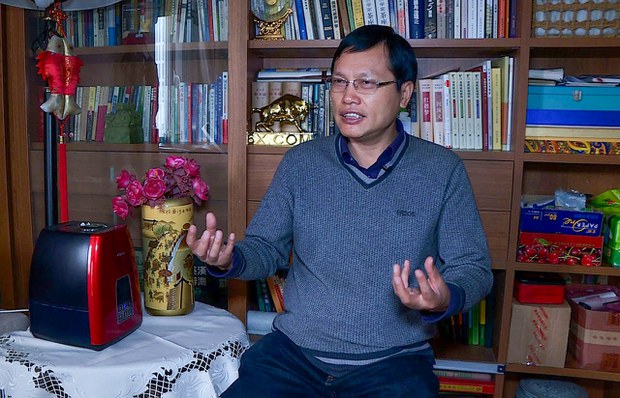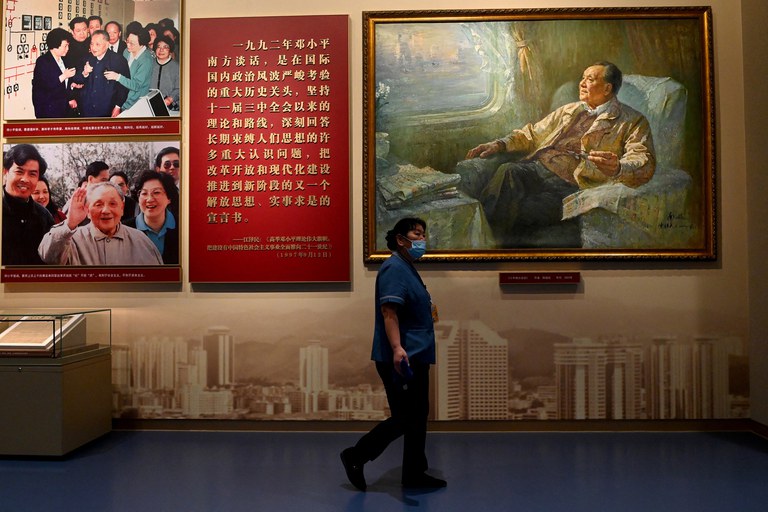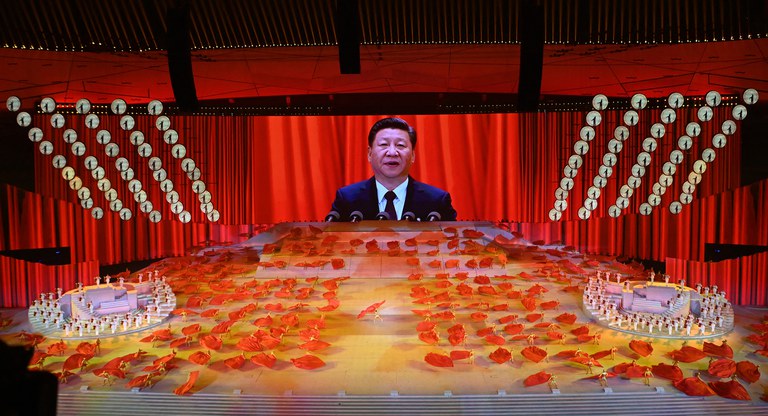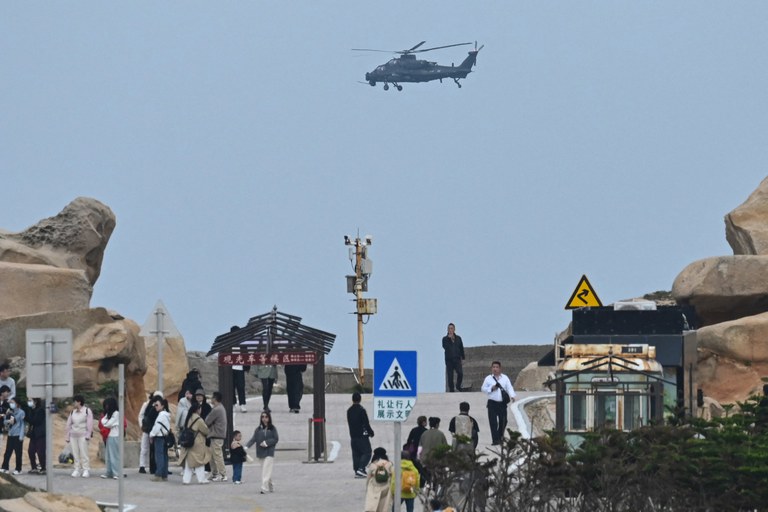Top Chinese economist calls for a return to Deng Xiaoping economic reform era
Share

Beijing Institute of Technology economics professor Hu Xingdou has called for an economic policy that benefits the most vulnerable.
A top Chinese economist is making waves with a recent call for a return to the economic policies of late supreme leader Deng Xiaoping, as ruling Chinese Communist Party leader Xi Jinping’s government struggles to inject life into the country’s economy after three years of the zero-COVID policy.
The reform era ushered in by late Chairman Mao Zedong’s successor Deng Xiaoping saw people freed up to make money as fast as they liked, and the start of a burgeoning private sector and a decades of export-led economic growth, while political ideology and authoritarian rule took a back seat.
Xi is widely seen to be moving in the opposite direction, cracking down on private sector wealth and power and boosting the state-owned economy while eroding the freedoms enjoyed by the country’s middle classes.
In a 10-point plan posted online earlier this month, Beijing Institute of Technology economics professor Hu Xingdou calls for an economic policy that benefits the most vulnerable, echoing Deng’s view that such an approach would benefit political stability in the longer term.


However, many of the points aren’t confined to economic policy, and represent a public challenge to the left-leaning, command economy moves made by Xi, including deteriorating ties with developed countries.
“Reaffirm Deng Xiaoping’s strategy, and the principles of keeping a low profile … and not demarcating by ideology,” reads “suggestion” No. 4.
“Strive to build good relationships with developed countries, coexist peacefully, and avoid a new Cold War,” Hu writes, in an apparent reference to growing confrontation with Washington over trade, human rights and democratic Taiwan, which Xi has threatened to invade if its 23 million residents continue to spurn calls for “peaceful unification.”
Pointers on politics
Suggestion No. 5 includes some pointers for managing domestic politics.
“Reaffirm our total repudiation of the Cultural Revolution, change the ‘struggle’ mindset … and change the Red Guard Wolf Warrior image of Chinese spokespersons, especially the foreign ministry spokesperson,” it said.
Suggestion No. 6 took aim at Xi’s abolition of presidential term limits, paving the way for his indefinite rule as head of party, state and military, a move that many have criticized as a “cult of personality” with parallels to late supreme leader Mao Zedong.
“Stick to Deng Xiaoping Thought: free the mind, seek truth from facts and [return to] a term system for leaders,” it reads.


Hu’s 10 points aren’t the first time influential voices have been raised in dissent; in 2021, Communist Party newspaper the People’s Daily printed a 4,000-character essay by Qu Qingshan, dean of the Central Party History and Documentation Research Institute, lauding Deng’s approach.
But in February, officials deleted references to Marxism, Leninism, Mao Zedong Thought, the thought of Deng Xiaoping and the ideologies of former presidents Jiang Zemin and Hu Jintao from the latest edition of the document titled “Working Procedures for the State Council” that was published on official websites on March 18.
Hu also called for Xi’s flagship Belt and Road Initiative – which has been criticized as a debt trap for poorer countries – to be scaled down or canceled.
And, in suggestion No. 8, he blamed Xi’s hawkish stance on Taiwan for “an eastward shift in the United States’ strategic center of gravity” into the Indo-Pacific.
He called for an end to military construction and reclamation operations in the South China Sea, and a deescalation of territorial disputes with Japan and Southeast Asia countries over islands and island chains in the region.
‘Moving towards modernization’
Hu’s model also nixed Xi’s attempts to export China’s model of authoritarian rule worldwide, and for China to continue to benefit from the existing world order.
“If the entire world post World War II had been dominated by planned economies, economic controls, totalitarian government and religious extremism, what opportunity would China have had to reform and open up?
“To whom … would it have opened up?”
Hu concludes: “These 10 steps may be the only option to get China out of its predicament and moving towards modernization.”


Hu declined to be interviewed when contacted by Radio Free Asia on Wednesday, citing his university’s regulations, but confirmed that he wrote the article, which started to spread online after it was retweeted by U.S.-based commentator Wu Zuolai.
Wu told Radio Free Asia on Wednesday that the suggestions are indeed a call to Xi to change direction and go back to the policies that had served his predecessors well.
He said Hu was hoping that the government would accept his ideas in the form of suggestions, which are a part of the Chinese Communist Party’s internal feedback process, and the right way to go in the context of Chinese politics.
“Somebody – whether an ordinary person or even a leader of the Central Committee of the Chinese Communist Party – needs to set him right, regardless of how big a mistake he is making, at exactly the right moment in history,” Wu said.
“Lots of people need to tell him that he’s making a mistake.”
Wishful thinking
But former party school professor Cai Xia, commented online that Hu’s move was “either stupid or pedantic,” and showed Hu lacked the courage to go to jail for opposing Xi, but still wanted praise for his courage.
U.S.-based current affairs commentator Heng He said Hu’s comments were definitely a form of wishful thinking.
“They sound great, but they’re impossible to implement,” Heng said. “The policies Xi Jinping is implementing now aren’t coming from the perspective of national development, but of protecting Chinese Communist Party rule.”
“[So Hu Xingdou’s starting point] isn’t going to convince any high-ranking official,” he said.
“If our economic growth were founded entirely on private enterprises and free movement of capital, then the economic foundation for Communist Party rule would be gone,” Heng said. “That would be the end for the Communist Party, so they can’t do it.”
He said Deng’s economic reforms sought to rely on two key factors — the economic strength of the United States and the “enthusiasm” of the Chinese people to make money.
But neither of those factors is likely to reboot the Chinese economy now that Sino-U.S. ties are at their lowest ebb for decades and amid falling investor confidence in the wake of three years of zero-COVID restrictions, he said.
As for winding down the Belt and Road Initiative, Xi can’t do that either, Heng said.
“If you want to become a major world power, you must have international support,” he said. “The Chinese Communist Party has set itself to compete with the United States, so it has to buy its friend.”
“How will it find allies without spending money?”
Translated by Luisetta Mudie.







